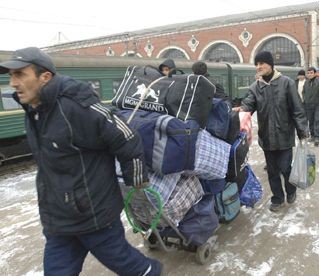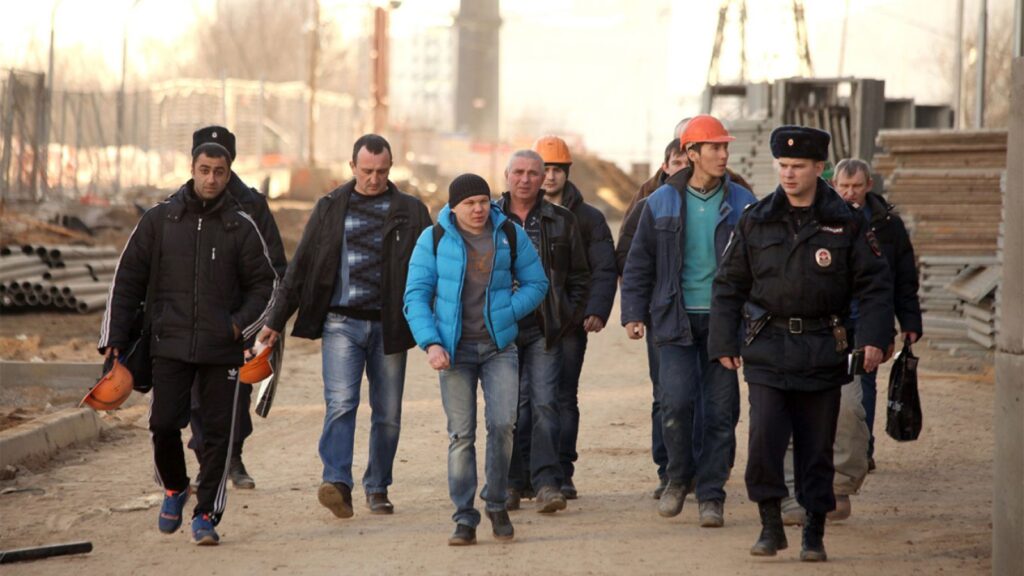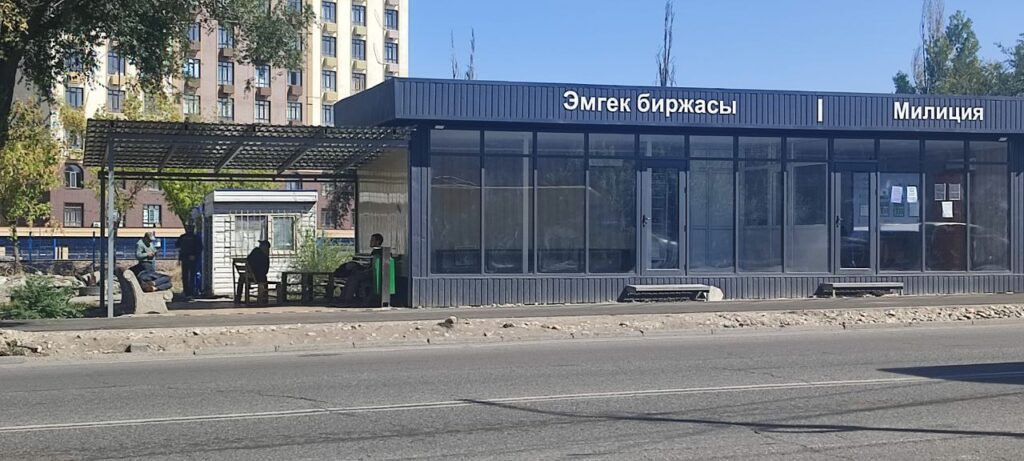BISHKEK (TCA) — The Russian Interior Ministry has proposed to significantly increase penalties for providing housing and bogus residence documents to illegal migrants.
Experts say these changes would lead to further criminalization of the intermediary services for migrants. Many companies providing services in this area have been recently closed but demand creates supply, and many individuals have started intermediary services replacing the closed companies. Few migrants use the services of employment agencies. According to statistics, only 11,560 people officially applied for employment in 2015.
Blacklist
It is difficult to expose and punish those providing illegal services, and, as a result, labor migrants who use such services have suffered as more citizens of Kyrgyzstan have been “blacklisted” by Russian authorities.
According to recent data, 119 thousand Kyrgyz migrants are now registered by the Russian Federal Migration Service (FMS) in its blacklist. Those people are denied entry to Russia for violations of administrative, criminal and immigration laws. The entry is prohibited for three to ten years.
According to the Kyrgyz State Migration Service, Kyrgyzstan citizens can now use its website to check whether they are in the blacklist of the Russian FMS. A similar service is available on the website of the Ministry of Internal Affairs of Russia.
Every third Kyrgyzstan citizen is in labor migration abroad, Kyrgyz Prime Minister Sooronbai Jeenbekov has said. Kyrgyz authorities cannot provide their citizens with work at home, and they fail to defend their rights abroad, although migrant workers provide the lion’s share of the country’s GDP. In the first eight months of 2016, remittances from Russia to Kyrgyzstan totaled $1.26 billion, $143.6 million more than in the same period last year. On average, each Kyrgyz labor migrant sent to Kyrgyzstan $184 per month, while each Tajik labor migrant sent home $113 and Uzbek $90 per month.
Violations of rights
Despite the fact that Kyrgyz universities’ diplomas should be recognized in all the Eurasian Economic Union countries, most Kyrgyz migrants do not work in their profession, the Kyrgyz State Migration Service said. About 37% of migrants from Kyrgyzstan have higher education but only 13.8% of them work according to their profession.
Kyrgyz citizens in Russia are mostly engaged in construction, the services sector, and trade.
This week, the Kyrgyz Embassy in Russia held a meeting in Moscow with migrants from Kyrgyzstan to discuss problems they face in Russia. The problems are migration registration and violations of the rights of labor migrants.
The Russian authorities have increased the number of inspections in the areas of compact residence of labor migrants from Kyrgyzstan and deported illegal immigrants from Russia, the migrants said.
According to labor migrants, they cannot be registered at places of actual residence due to the refusal of the owners of apartments they rent. The situation is similar with the conclusion of employment contracts. As a result, the life of labor migrants from Kyrgyzstan has deteriorated. The meeting decided to send a collective letter from labor migrants to the Kyrgyz Parliament and Government.
Moscow Mayor’s statement
At his year-end press conference on December 1, Kyrgyz President Almazbek Atambayev, answering reporters’ questions, said that the recent statement of Moscow Mayor Sergey Sobyanin on migrants from Kyrgyzstan surprised him. On November 28, Sobyanin called migrants from Kyrgyzstan the main problem of the city, after Moscow residents had asked the authorities to take decisive measures to restore order in the migration sphere.
According to various estimates, more than 40% of labor migrants are working in Moscow illegally, the Mayor said. It concerns mainly the so-called shift workers who have the right to live in Russia without registration for less than 90 days.
The huge flow of migrants does not add to safety of the city, he said. Migrants from Kyrgyzstan do not legalize labor relations, do not pay taxes, and often live in industrial areas in unsanitary conditions. “Therefore, together with the Russian Government we are looking for ways to find a legislative solution to this problem,” Sobyanin concluded.
President Atambayev did not agree with the Moscow Mayor. “Migrants from Kyrgyzstan are the most law-abiding and conscientious ones. I think Sobyanin was provided with biased information. Kyrgyzstan is a Eurasian Economic Union member country, and Sobyanin should first ask the Russian employers why they do not sign labor contracts,” the Kyrgyz President said.
To reduce illegal migration, the Russian Government should consider responsibility of unscrupulous employers who do not register labor migrants to avoid taxes. This leads to the illegal status of Kyrgyz citizens in Russia, the Embassy of Kyrgyzstan in Russia commented on Sobyanin’s statement. The Embassy is going to submit proposals on this issue in bilateral format and in within the EEU.
In the meantime, on December 9, a group of labor migrants from Kyrgyzstan held a rally near the Kyrgyz Embassy in Moscow. They protested against the increasingly frequent inspections, detention and deportation of labor migrants by the Russian police. The Moscow police detained several protesters but later released them.








